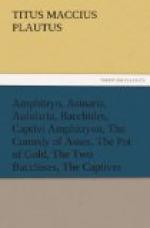Tynd.
Salva res est, philosophatur quoque iam, non mendax modo est.
(aside)
The situation is saved! Now he not only lies but
moralizes.
Hegio
Quid erat ei nomen?
What was his name?
Philocr.
Thensaurochrysonicochrysides.
Ducatsdoubloonsandpiecesofeightson.
Hegio
Videlicet propter divitias inditum id nomen quasi est.
A sort of name
applied to him on account of his money,
I take it.
Philocr.
Immo edepol propter avaritiam ipsius atque audaciam.[10]
(apparently
struck by a new idea) Lord, no! on account of
his being so greedy
and grasping, sir.
Hegio
Quid tu ais? tenaxne pater est eius?
What’s that? His father’s rather close, is he?
Philocr.
Immo edepol pertinax; quin etiam ut magis noscas: Genio suo ubi quando sacruficat, 290 ad rem divinam quibus est opus, Samiis vasis utitur, ne ipse Genius surripiat: proinde aliis ut credat vide.
Close? My word, sir! he’s adhesive! Why, really,—just so as to give you a better notion of him—whenever he sacrifices to his own Guardian Spirit he won’t use any dishes needed in the service except ones made of Samian earthenware, for fear his very Guardian Spirit may steal ’em. You can see from this what a confiding character he is in general.
Hegio
Sequere hac me igitur. eadem ego ex hoc quae volo exquaesivero. Philocrates, hic fecit, hominem frugi ut facere oportuit. nam ego ex hoc quo genere gnatus sis scio, hic fassust mihi; haec tu eadem si confiteri vis, tua ex re feceris: quae tamen scio scire me ex hoc.
Well, well, come this way with me. (aside, as they join Tyndarus) I’ll soon get the information I want out of the master here at the same time. (to Tyndarus) Philocrates, your servant has acted as a worthy fellow ought to act. Yes, I know from him about your family: he has admitted everything. If you choose to be equally open with me, it will be to your advantage: however, I have been completely informed already by him.
Tynd.
Fecit officium hic suom, cum tibi est confessus verum, quamquam volui sedulo meam nobilitatem occultare et genus et divitias meas, Hegio; nunc quando patriam et libertatem perdidi, 300 non ego istunc me potius quam te metuere aequom censeo. vis hostilis cum istoc fecit meas opes aequabiles; memini, cum dicto haud audebat: facto nunc laedat licet.
(with dignified melancholy) He has done his duty in admitting the truth to you, much as I did wish to keep you in the dark, Hegio, about my rank and birth and wealth; now




